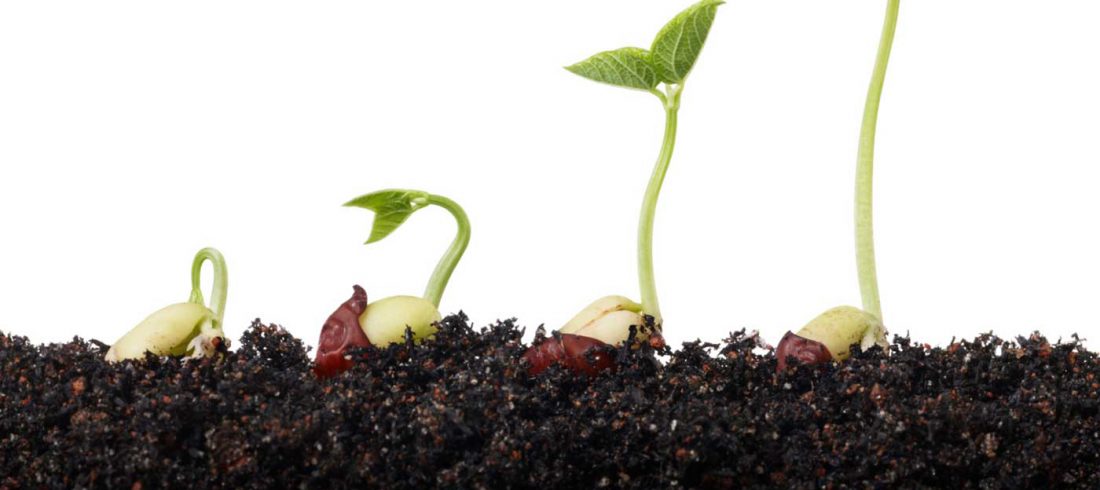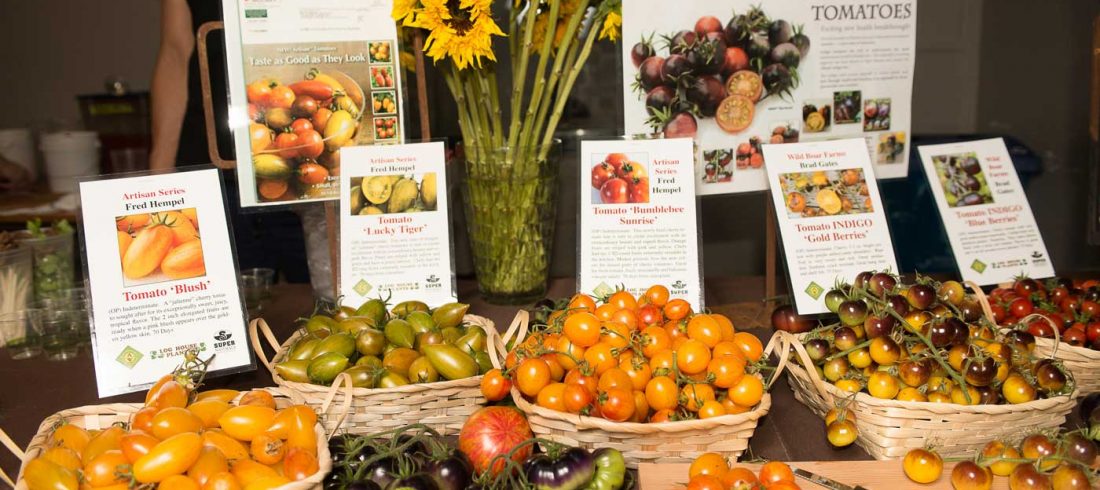A tiny green shoot breaking free from its slumber heralds the start of spring. We often think of the season as renewal, as if the world automatically turns green again like magic.
But farmers in the southern Willamette Valley know the yearly replenishment of local food resources is more science than magic. Saving seed, grafting young plants, and developing cultivars that grow well in our maritime climate ensure that local seed producers keep our food shed strong and diverse.
For growers, the seed saving season starts when the nights get cooler in the fall. They play a game of Russian roulette with the weather, trying to dry seeds on their stalks in crops like beans and lettuces before the fields are inundated with rain and the air is saturated with moisture. Often, farmers devote their barns and even living rooms to drying squash or corn in the winter.
One of the premier seed producers in the valley, Territorial Seed Company (territorialseed.com), pioneered the business of taking regional seed from field to garden in packages ornamented with lovely watercolors of vegetables and herbs. Owners Tom and Julie Johns are dedicated to producing seeds that grow into plants best suited to our climate and soil. Over the past four decades, the trial garden that was once a collection of neighbors’ backyard plots has grown into a 75-acre trial farm and seed saving facility in Cottage Grove, with areas that are certified organic and biodynamic.

“We are still a family-owned and -operated business and doing our own selections here to see what works best in the Willamette Valley,” says Tim Russell, Territorial’s Marketing Director. “We produce about 35 percent of what we offer, and for the rest we work with a lot of local seed companies and plant distributors.”
And there are many of seed companies in the valley to choose from. We live in one of the top areas in the world for specialty seed crops. Understanding our bounty depends on an appreciation of the science of seeds, a heady mix of genetics, and legal terminology.
Andrew Still, an intense young farmer out of Sweet Home, excels at both. He runs the seed company Adaptive Seeds (adaptiveseeds.com) with his partner Sarah Kleeger, producing a detailed catalogue which blends origin stories for crucifers with essays on farm policy and local gardening lore.
A grower can select for vigor and certain traits, or pull out plants with negative qualities so they don’t mix. Some plants self-pollinate, and some need other plants. Still points to his ‘Kale Coalition’ as an example of the latter. “It’s a swarm of crazy crosses, with 14 varieties of kale in the mix,” he explains, “and each plant is very different from one another—some tall, some bushy, flat leaves, curly leaves. We’re breeding for resilience and diversity as an act of seed stewardship, so if one plant doesn’t do well in your garden that year, others will. This is something an inbred hybrid can’t deal with.”
The “inbred hybrids” which Still speaks of are crucial for commercial plant growing, where proprietary cultivars or “F1 hybrids,” are the product of two parent lines studiously pollinated to insure standardized genetics. The resulting plants can be distributed only by the entity that owns the rights to the F1 hybrid, and seeds can’t be saved from these plants because the vigor and character traits bred into the plant are unstable, or do not grow predictably the next year. They are, literally, inbred. Seeds saved from a F1 hybrid will grow plants that appear nothing like their parent, so the farmer must buy new seeds each year. It’s an insurance policy for repeat customers of a reputable tomato, like ‘Big Beef’ or ‘Celebrity,’ both F1 hybrids owned by Monsanto, or the new ‘Indigo Rose’ line developed by Jim Myers at Oregon State University.

As proprietary products, F1 hybrids are subject to legal action and controversy. By eliminating the ability to save true seeds, subsistence farmers around the globe are forced to devote profits to buying seed year after year. Still asserts that F1 hybrids serve to reduce diversity, since robust new lines are not being created by uncontrolled crossing in the fields. Because the process is quite profitable on large scales, large agribusinesses are involved in creating and enforcing patents for new hybrids.
Smaller growers like Everett, WA-based independent plant breeder Tom Wagner (tatermater.proboards.com), most known for his ‘Green Zebra’ tomato, struggle against the large corporations. It is difficult to get credit for new lines like his fancifully named blue/black tomatoes that are products of crosses related to the ‘Indigo Rose’ lines, including ‘Dances with Smurfs,’ available through Log House Plants (loghouseplants.com) and ‘Wagner Blue Green,’ available through Baker Creek Heirloom Seeds (rareseeds.com). A coalition of farmers, including Still, take the fight in a more radical direction. They support the principles espoused by the Open Source Seed Initiative (opensourceseedinitiative.org), which encourages growers to free their seeds from proprietary restrictions altogether in the name of increasing diversity.
Other exciting developments in the seed world include better tasting gourmet vegetables developed at a farm near you. Lane Selman, an agricultural researcher working with Jim Myers at OSU and the director of the Culinary Breeding Network (culinarybreedingnetwork.wordpress.com), works on what she calls “community-driven plant breeding,” involving chefs, wholesalers, and school farms. She unites cooks and growers to choose crops for flavor and qualities that make them easier to use in the kitchen.

“Conventional breeding selects for yield, uniformity, and shippability,” she says, “we’re developing lines from older stock that valued taste over large-scale commercial use.” The Network, which just received a grant to continue its work for several more years, offers tastings of different varieties of the same crops, including a recent pepper tasting that hosted dozens of local chefs, who “freaked out” over a pepper grown by Wild Garden Seed’s Frank Morton. Its rich taste and smooth sides were both easy to use and far tastier than the F1 hybrids considered the best prior to the tasting.
Like F1 hybrids, genetically engineered organisms (GEOs), often called by a more familiar name substituting the term “modified” (GMOs), are subject to controversy in the Willamette Valley. They made local news last year with the narrowly defeated initiative to label all products that contained them, but they have also been implicated recently in the Oregon Department of Agriculture proposal to allow canola, a crop that is almost completely made of GEO seed and can cross-pollinate with specialty lines like Still’s kale, in the Valley. Seed growers fought successfully in 2013 to keep the canola ban in place until more research could be conducted on potential contamination.
GEO plants also have proprietary patents like F1 hybrids, but they are different because they take hybridization to the next level. Alice Doyle, who heads up the team at Log House Plants (loghouseplants.com) in Cottage Grove, explains.
“Genetically modifying is something we’ve been doing for a long time,” she states. “When we select for more sweet or less bitter or less oily for fruits and vegetables, we are modifying organisms. GEO, the engineered organisms, are more worrisome to us. Not just using the same genus to cross, but splicing other families into organisms, like luminescence into sheep. There’s no track record yet.” Furthermore, bioengineered crops can cross-pollinate with others, spreading the genetic material without the farmer realizing it and destroying intentional hybridization on a farm. This is a particular problem with the significant GEO sugar beet crop in the mid-Valley, one that easily crosses with chard grown in the specialty seed industry.
One alternative to hybridization is the science of grafting. A technique most often and traditionally employed by fruit tree growers, grafting technology is “moving at warp speed,” with over a billion grafted plants distributed worldwide in 2011, according to Doyle. The Mighty ‘Mato line, distributed by Doyle and team under the flagship SuperNaturals Grafted Vegetables (graftedvegetables.com) brand, has been on the market for five years, and now features around 50 varieties of tomatoes, eggplant, melon, and cucumber.
Grafting is defined most simply as taping or otherwise connecting the stem of one plant to that of another to capture strengths of both plants. The top of the grafted plant is usually a more delicate cultivar, and the bottom hails from a wild or strong stock that roots and feeds the plant well.
“With a grafted plant there’s less need for prime or undiseased soil, and the grower needs less pesticide, less water, and less fertilizing to feed the world,” says Doyle.
Grafting also enables modifications like two kinds of apples on one tree and a more fascinating specimen that Doyle believes will delight beginning gardeners. Originally produced as a curiosity by none other than Luther Burbank (a pioneer in agricultural sciences), it’s a hybrid potato-tomato plant grown by SuperNaturals and premiering in America this spring, ‘Ketchup ‘n’ Fries’; by TomTato.
Makes you wonder: What could be next?

